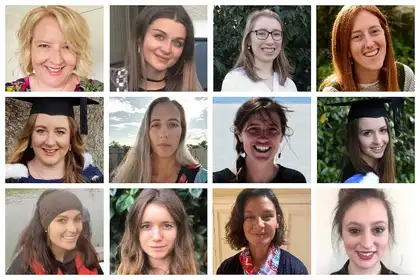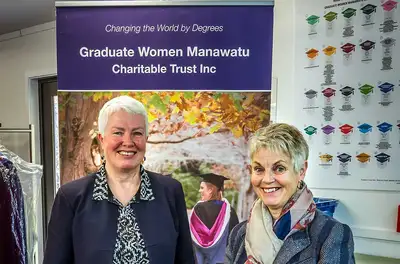
This year's recipients of the Graduate Women Manawatū Charitable Trust scholarships (top row, from left): Sharleen Andrews, Nicole Ashley, Anika Connelly and Rebecca Conway; (middle row, from left): Sarah Wilson, Kimberley, Dorte Wray and Catherine Davenport; and (bottom row, from left): Ariana Mackay, Sophie Newmarch, Renata Lodge and Brooke Hopkinson.
Twelve of Massey University’s top female scholars have been awarded scholarships from the Graduate Women Manawatū Charitable Trust Inc to support their research across a wide range of topics, from mental health and environmental management to new methods for COVID testing.
The recipients were selected from a strong field of postgraduate women students who are currently enrolled across Wellington, Manawatū, and Auckland campuses, either face-to-face or by distance.
“These women are excelling in their studies and have demonstrated the potential to become influential women in their chosen field,” says Ainsley Watson, Manager of Academic Dress Hire, which raises funds for the trust towards supporting women in education.
Chair of the Graduate Women Manawatu Charitable Trust Inc, Dr Glenda Anthony, says that “as part of our mission to support and empower women through education the Graduate Women Manawatū Charitable Trust has funded these scholarships to a total of $69,000,” she says. “Collectively, their studies represent a range of research applications that will serve to impact positively on many spheres of our lives in Aotearoa New Zealand.”

Graduate Women Charitable Trust's deputy chair, Dr Jo Innes (left) with chair, Professor Glenda Anthony.
Scholarship recipients
Anika Connelly is investigating how Applied Statistics can be used to understand genetic links between rye grass and a fungus which lives in its tissues. As part of her Master of Applied Statistics, she aims to implement statistical methods to investigate how the genes in the two species “talk” to each other. Rye grass is an important pasture species in New Zealand and investigations into the relationship it has with the fungus will be beneficial to the agricultural sector.
Ariana Mackay is investigating the sedimentation rates and seed bank of Wairoa’s Whakaki Lagoon for her Master of Science. She hopes her research will further knowledge of the ecosystem for both iwi and the regional rouncil, and support large-scale ongoing restoration efforts. Whakaki Lagoon, a large (4.75km2) shallow lake located north of Wairoa, Hawkes Bay, is currently in an algal-dominated eutrophic state (where an abundance of nutrients supporting algal growth reduces oxygen).
Brooke Hopkinson is enrolled in full time study at the Manawatū campus to complete a Master of Arts (Psychology). Her thesis is intended to be Demands and Resources: Flourishing in The New Zealand Defence Force using the 2019 New Zealand Defence Force Health and Wellbeing Survey data, and seeks to investigate how job demands relate to flourishing, wellbeing, and turnover intention. “My research will explore if both personal and job resources moderates or mediates the relationship between job demands and flourishing, wellbeing, and turnover intention.”
Catherine Davenport is part of team working to develop a rapid diagnostic test for COVID-19, based on using biological nanorods to detect the virus. Her Bachelor of Science (Honours) project focuses on developing a method for modification of these biological nanorods, so that they can produce visible results on the dipstick test which can be easily used in doctors’ clinics and hospitals without further imaging or processing.
For her Masters in Environmental Management Dorte Wray is conducting action research methodology that includes collaboration with the Zero Waste Network – a group of organisations trading in reused and recycled materials. The project seeks to understand the sector’s various impacts, and to develop a framework for collective reporting and story telling.
“There is growing recognition of the harm caused to our natural world by our throwaway thinking and make-use-waste economic model,” she says. “An alternative zero waste approach envisages a world where nothing is wasted, and all resources are valued and reclaimed.”
Kimberley is completing a Master of Business Studies (Marketing), and focusing her research on how to maximise small service market businesses profits and growth, as well as contributing to the shaping of profitable growth and sustainability practices throughout local and national businesses. “My hope is that this research will assist New Zealand’s economy in this time of uncertainty fuelled by Covid-19,” she says.
Nicole Ashley says climate change requires complete, global transformations in how we relate to each other – not only other people, but also other life forms. For her Master of Arts (Sociology) her research seeks to rethink nature-society relations by exploring where possibilities of hope might emerge for more sustainable futures in Aotearoa. She is exploring the notion that “humans have long been conceived as somehow separate from the environment, evidenced in split between the natural and social sciences. Dominant assumptions of nature’s boundaries work to abstract the human from interspecies relations, and I believe this limits our ability to imagine other ways of living.”
Rebecca Conway is exploring how eco-anxiety affects people in Aotearoa New Zealand for her Master of Applied Social Work. She is committed to making a positive difference in people’s lives and improving the quality of life in a range of communities. The aim of her research is “to explore the indirect effect of climate change on the mental health and well-being of people in Aotearoa New Zealand.”
Renata Lodge’s research considers the key factors known to influence whether a society moves towards or away from gender equality in the period after a civil war. “Societies go through huge political and social transformations after conflict,” she says. “In some cases, this post conflict transformation gives rise to massive changes in gender relations including significant increases in the number of women in politics and legal and policy reforms towards gender equality, but this isn’t always the case,” says Renata, who is undertaking a Master of International Development in a Pacific context using the Solomon Islands and Bougainville conflicts as case studies.
Sarah Wilson is investigating the role of the HDAC4 gene in the growth of neurons (nerve cells), which occurs during the formation of new memories for her Master of Science research project. She hopes that a better understanding of the memory-forming interactions between the gene and the protein Ankyrin2, as well as their memory-impairing mutations, could aid in drug targeting therapies for neurodegenerative disorders such as dementia.
Sharleen Andrews wants to apply her studies in social services and trauma management with knowledge and skills from the MBA she is currently studying to the health and wellbeing sector. “The recent world pandemic has changed the way we work with people, bringing about ideas on how we can support people ‘where they are’ not where we want them to be. Good communication in business and especially within the mental health sector is paramount to successful outcomes for the people that we serve, and I look forward to creating exciting positive change.”
Sophie Newmarch is studying the native iris Libertia as means to understanding how our flora has evolved. “The New Zealand flora is a unique, diverse, national treasure,” says Sophie, whose Master of Science research project is focused on the phenomenon of whole-genome duplication. To understand when and how duplication events occurs and the evolutionary consequences, she will reconstruct the evolutionary history of Libertia. “Patterns, including New Zealand’s climatic history, niche shifts, and floral trait innovations, will then be overlaid to gauge what pressures were present when duplication occurred and how it enabled diversification in Libertia species.”
Due to COVID-19 lockdown, the annual lunch to present the scholarships was unable to go take place.